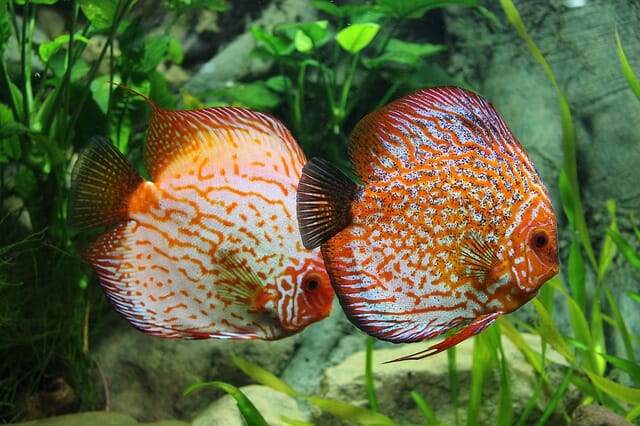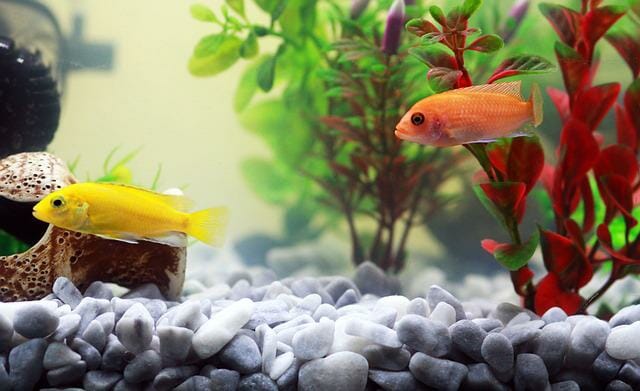Why Is My Fish Acting Weird: Most Common Reasons and Treatment

If you have a fish that is not behaving the way it should be, there are many possible reasons. For example, fish can get sick, stressed out from changes in their environment, or simply not feel well. If you are unsure what might be wrong with your fish, read on for some tips on determining the cause of their abnormal behavior.
Many factors can affect the behavior of fish, but one of the most common reasons for fish to act differently or weirdly is because they’re stressed. For example, when fish are stressed, they may swim in a different direction, eat or drink more than usual, or even exhibit aggressive behavior if you notice that your fish is behaving strangely. You can’t figure out why it may be a good idea to take it to a veterinarian for an evaluation.
Table of Contents
Causes of Weird Acting in Fish
Abrupt Changes in the Aquarium
Fish are sensitive to changes in their environment and can become stressed very quickly. This is especially true for fish with specific conditions in their aquarium or pond. If the conditions change suddenly, the fish may not be able to adapt and may become agitated or ill. You can do several things to help your fish adjust if this happens:
- Keep an eye on them.
- Please provide them with plenty of hiding places.
- Change the water regularly if necessary.
Unstable Water Temperature
Fish feel stressed when their water temperature drops below 76 degrees Fahrenheit (25 degrees Celsius). This happens when the temperature outside is colder than the water’s temperature. Fish naturally swim up to the surface to take in air and warm-up, but when the water temperature drops too low, they can’t do this. This results in them feeling stressed and swimming around aimlessly. To prevent your fish from feeling stressed, make sure their water stays at a comfortable temperature.
Unstable Water pH
Fish have a very delicate system in their gills that helps extract oxygen from water. When the pH of the water changes suddenly, this system can become overloaded and cause stress to the fish. This can lead to problems with breathing, eating, and breeding. To prevent these problems, it is essential to keep your pH levels stable and always check with your fish store or breeder before making any changes.
Improper Dechlorination
When you keep fish, it is essential to make sure their water is dechlorinated correctly to prevent them from experiencing stress. Chlorine is a chemical used to sanitize water, so if the chlorine levels in your fish’s water are too high, it can be stressful for them. Unfortunately, too much chlorine can kill your fish’s beneficial bacteria, making them sick. If you’re not sure whether or not your water has been appropriately dechlorinated, contact a professional to check.
Bacteria Crash
When a fish feels stressed, its body reacts by releasing toxins. This happens when you have a bacterial or fungal infection, and your immune system starts to attack the bacteria or fungus. The released toxins can affect the fish’s organ systems, including the gut and eyes. In some cases, these toxins can even cause death.
Wrong Aquarium Conditions
It’s no secret that fish can be pretty picky in their environment. The wrong conditions can cause them much stress, leading to weird behavior. Here are four common culprits that can upset your fish:
Low Oxygen Levels
Fish need plenty of oxygen to survive, so if the water they’re living in is low in oxygen, they’ll start to show signs of distress. This is especially common in new tanks or tanks that have been recently filled with fresh water.
High Temperatures
Exposure to too much heat can also be harmful to fish and cause them to become stressed out and act strange. Make sure the tank your fish lives in isn’t too hot or cold – ideally, it should be a temperature between 76 to 80 degrees Fahrenheit (25 to 27 degrees Celsius).
Crashing pH Levels
Freshwater fish have been living in the same water their entire lives, so anything that happens at home can be very stressful! So, for example, if your tap water has a poor acidity level or has too many minerals (usual chlorides), this can cause harmful changes and stress for both the fish and you.
Changes From Seasonal Affective Disorder
The seasonal affective disorder is a type of depression that affects people during the fall, winter, and early spring. It’s similar to seasonal marine fish stress in that it can cause strange behavior and poor health.
Bully Tankmates
There are a few things that can cause stress to fish. One of the leading causes of stress is bullying. Bullies can intimidate and bully other fish in the tank, leading to them feeling stressed out and scared. In addition, bullies can damage or remove essential oxygen and food supplies, leading to stress in the fish. If you see your fish acting strange or stressed out, it may signify that they’re experiencing some form of bullying. It would help if you tried to work with other tankmates to stop the bullying and allow the fish to feel more comfortable again.
Diseases or Parasites
Ammonia Poisoning
Fish can become stressed out from ammonia poisoning, caused when the ammonia levels in your water get too high. Ammonia is a chemical produced when organic material, like fish poop, breaks down. High ammonia levels can damage your fish’s gills and make them sick. Poor water quality also causes stress to fish because it makes it difficult for them to swim and breathe. If you suspect your water has high ammonia levels or poor water quality, take steps to fix the problem before your fish get stressed out.
Glass Surfing
Glass surfing is a popular hobby of hovering or sailing with glass pieces above water. This activity can be very stressful for fish, as they may be unable to escape from sharp objects moving around. Fish can become entangled in the glass, and if they are injured, they may suffer from pain and death. If you’re concerned about your fish’s wellbeing while glass surfing, take precautions and stay safe!
Swim Bladder Disease
Swim bladder disease, or urogenital hernias, is a common condition in fish. It’s caused by a weakness in the wall of the fish’s bladder. This weakness can cause stress to the fish, leading to swimming bladder disease. Swim bladder disease can also be caused by other factors, like pollution or changes in water temperature. For example, suppose you notice that your fish behaves oddly and has swim bladder disease. In that case, it’s essential to take him to a veterinarian as soon as possible for an examination and treatment.
Whirling Fish Disease
Whirling Fish Disease (WFD) is a viral infectious disease that can affect much fish, including catfish, tilapia, goldfish, and even carp. The virus is spread through the water from infected fish to healthy fish and can cause serious health problems in both the infected and uninfected fish.
How to Treat Fish That Are Acting Weird?
The best way to determine why your fish is acting weird is to take it to a qualified veterinarian. However, if you are in a hurry, some of the following tips may help:
- Check the water quality. If your water has a foul odor or high ammonia or nitrite levels, your fish may be sick.
- Check the water temperature. If it is too cold or hot, your fish may be uncomfortable or ill.
- Check the food and water conditions. Make sure that your fish has fresh food and clean water every day.
- Calm the fish down by placing it in a plastic bag or container.
- Change the water and food regularly, and add fresh air if necessary.
- Feed the small fish meals frequently, rather than one large meal.
- Try to keep the tank as calm as possible by avoiding sudden movements or loud noises.
- Make sure their tank has a good filter and change the water regularly to keep it clean and healthy.
